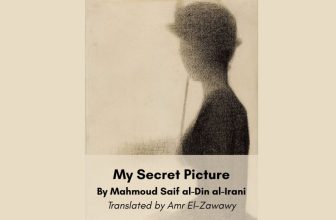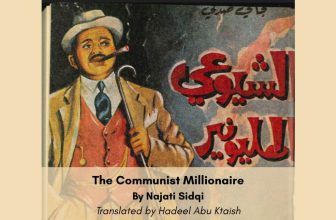
Winner of the 2021 Prix des Cinq Continents de la Francophonie, Karim Kattan’s The Palace on the Higher Hill — beautifully translated by Jeffrey Zuckerman and out this month from Foundry Editions — opens when Faysal receives a letter about the death of aunt he can’t remember. He leaves life and lover behind to return to the village where he was raised in Palestine, and particularly to his family home, the titular palace on the higher hill. The novel is both extraordinarily grounded and surreal, with the dreaminess of Kazuo Ishiguro’s The Unconsoled pinned to the hard reality of violent settler colonialism. This excerpt is near the beginning of the novel, after Faysal has returned, when he’s getting a grip on the world around him.
From ‘The Palace on the Higher Hill’
By Karim Kattan
Translated by Jeffrey Zuckerman
What isn’t empty, though, is the horizon with its growing number of settlements. When I came back here, two weeks or a whole equinox ago, they were just a thin, barely perceptible line on the horizon. Jabalayn has always been a secluded village and so it’s been spared the worst. But now the settlers have started closing in, getting nearer with each day. It boggles the mind how swiftly a settlement can be erected. It’s easy, just build it in the same old way: a hundred identical houses, all of them ugly. Now, from the conservatory or the terrace, I can see the windows, and, at night when the lights are all on, I can make out heads and silhouettes. Which made it possible for me to decide. That’s why I’m writing to you today. The settlers will reach Jabalayn soon; a few days, at most. They’ll make their way into the ghost town. They’ll move triumphantly into the houses. They’ll say: “They weren’t here.” The town’s capture will be swift and barely remarked upon. Then they’ll look up. They’ll see, to the east, mournfully adrift in the sky, a spaceship devoid of astronauts. To the west, a palace. And they’ll venture up. They’ll see the rotting corpse of one of their own, and, inside, she or he who killed him.
That’s why Nawal summoned me. She can’t do anything about it herself. She thinks that my presence here might scare them off. She’d have liked for me to get a gun and sit on the terrace each morning, ready to shoot at any oncoming settler or soldier, to safeguard the family home. For me to be a man, a real man.
Every night, Nawal goes through the house three times, checks that each window is properly shut, each door locked. She inspects every darkened corner, every closet, no doubt worried that, should she let her defences down, something might jump out and swallow her world whole. She goes out into the garden and rummages through each shrub, to flush out the danger lurking within.
*
I have to tell you more about the morning I left. I wasn’t aware of anything about my homeland any more. I did have some back and forth with the lawyer who— hold on, that can wait. Now isn’t the time to talk about the lawyer. I didn’t know what was happening. I’d gone and deleted every app and blocked every media outlet that might update me on what’s so very tactfully referred to, where you are, as “the situation”. I’d told myself that I needed a break. As you’ve no doubt heard, what they call their “offensive” broke out several months ago. Here’s a little secret: they think they’re God’s cowboys. The “offensive” they keep talking about is the day the settlers who’d already been occupying a large section of the West Bank decided that they were done waiting and it was time to strike. Their D-Day, I guess: they were going to take what they could of the territory, and take it by force. They rolled into the Palestinian towns, it was so easy, they just had to come in guns blazing, shoot a few dozen dead, and boom. It started out as a small-time guerrilla operation. Then, because they were so well organised, they assembled some sort of Judea–Samaria Armed Forces. They went all in, city by city, town by town, no holds barred. The world looked away; forgot that we existed. The countries around us actually approved: they let out a sigh of relief, rid at last of the most troublesome people of the century. The West Bank, this bit of land that doesn’t so much as have a recognised country name or status on the world stage, is a battlefield. Seeing how successful the operations were, more and more Israelis not living in the settlements joined the Judea–Samaria Armed Forces. They’re fanatics.
They felt like they could go right ahead and be themselves at last: a settler is just an Israeli whose mask of propriety has come off. And, in the end, they took almost all of it. They moved in everywhere. As I write to you, there are still a few remote spots like Jabalayn that haven’t fallen into Armed Forces hands yet: our last pitiable bastions. The official army left them be. I’d bet the army’s helping them (the same way that I’m pretty sure all the countries around us secretly are). On the radio, Israeli commentators wring their hands about what these military tactics say about Israel’s democratic integrity (“Oh, now they’re worried,” Nawal says to the radio, which still doesn’t reply).
Palestinian author Karim Kattan was born in 1989 in Jerusalem, grew up in Bethlehem, and holds a doctorate in comparative literature. His 2017 short-story collection Préliminaires pour un verger futur was a finalist for the Prix Boccace. The Palace on the Higher Hill, his first novel, won the 2021 Prix des Cinq Continents de la Francophonie, and his most recent novel, L’Eden à l’aube, was shortlisted for the 2024 Prix Renaudot.
Jeffrey Zuckerman is a translator from French of numerous writers, including Jean Genet, Hervé Guibert, and Ananda Devi. In addition to the many awards and honours he has received for his work, he was named a Chevalier de l’ordre des Arts et des Lettres by the French government.







